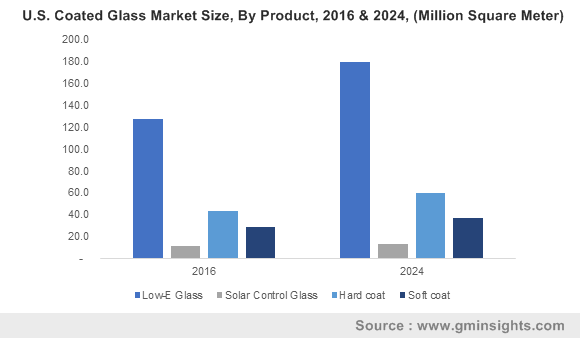Solar control coated glass market to gain substantial returns by 2024, development of smart glass technologies to influence the industry landscape
Publisher : Fractovia | Published Date : 2018-03-29Request Sample
Thriving on the cusp of energy efficiency that has emerged as the pivotal need of the hour as on today, coated glass market has garnered appreciable momentum since the last few years. In fact, with the growing trends of urbanization and industrialization, the demand for coated glass as a viable building material has been increasing. In this regard, the rising utilization of sustainable and energy efficient facilities in smart city projects and other construction developments would thus have a major impact on coated glass industry share.
U.S. Coated Glass Market Size, By Product, 2016 & 2024, (Million Square Meter)

Indeed, this glass is also extensively used in residential building construction to minimize the negative effects of UV rays and other hazardous radiations. Companies also seem to offer variations in this case - depending upon the building layout, thermal insulation or solar control glass can be preferred. Additionally, this business space is strictly driven by regulations enforced by authorized bodies in order to combat the growing change in climatic conditions and the subsequent demand for energy efficient buildings.
It is undeniable that the shifting trends toward the development of green buildings will massively boost coated glass market, as the product ensures low energy consumption and cost minimization. Lightweight solar control glass in fact is prominently used in the automotive and construction sectors, as it tends to reduce the usage of energy. It also curbs the usage of air conditioning equipment, pertaining to its capability to act as a thermal barrier and restricts UV and other infrared rays from entering buildings. With rapidly changing climatic conditions in tow, coated glass is being massively used to minimize heat. On these grounds, major giants in coated glass industry are looking forward to embedding solar cells in glass for producing electricity by utilizing solar energy.
In order to achieve revenue benefits and capture more business space, most of the players in coated glass market are focusing on increasing productivity by minimizing manufacturing time and improving product quality. In this regard, they are increasingly deploying automated systems for enhancing the glass fabrication process. Research and development activities are also rampant across this business space to bring forth a range of highly innovative products. For instance, recently, the researchers of VanadiumCorp Resource Inc., have developed an innovative, energy saving smart glass comprising vanadium as a coating material that saves more energy by restricting IR radiations from the sun to enter into building and preventing loss of heat during the winter season. This vanadium coated glass offers numerous benefits such as anti-glare, energy saving, and self-cleaning capability.
In the current scenario, well-known automakers have also been planning to deploy new technologies in vehicles in order to attract more customers. Recently, the Israeli start-up technology company, Gauzy has developed smart glass for displaying videos on car windows. It can play targeted localized information and will be used for smart messaging. Furthermore, the leading German automaker, Daimler AG has also collaborated with Gauzy for installing transparent displays on car windows. This newly developed advanced smart glass will help automakers serve futuristic technology to their customers. The ongoing revolution brewing in the automotive sector with the growing acceptance of smart glasses is slated to stimulate coated glass industry share.
As of now, in order to combat the challenges posed by global warming, many regional governments, mainly across the Asia-Pacific have been undertaking numerous initiatives to adopt sustainable technologies. For instance, the Singapore government has decided to increase energy efficiency with the deployment of smart-tinting windows across residential as well as commercial sectors. Currently, it is planning to install smart glass on nearly 12 buildings by 2021, as smart tinting windows can reduce at least 20% of the energy consumption of every building. The increasing popularity of tinting windows for minimizing the load on HVAC systems of buildings is poised to propel coated glass industry share over the years ahead.
The massive tech-based developments in industry are likely to have a significant impact on the overall industry trends. The increasing acceptance of energy efficient smart technologies and the unwavering commitment of regional governments toward carbon reduction, energy savings, and sustainability are also slated to commendably boost the product demand. If estimates are to be believed, coated glass market size, by the end of 2024, will surpass a valuation of USD 24.5 billion.